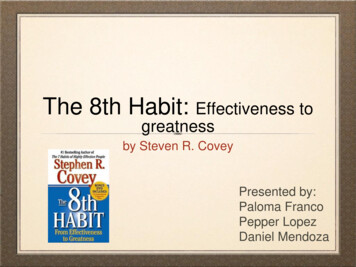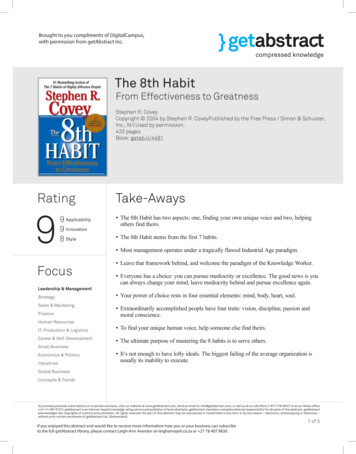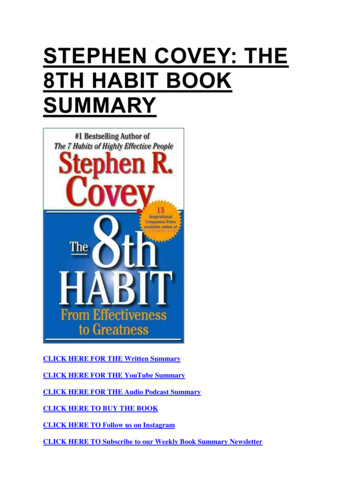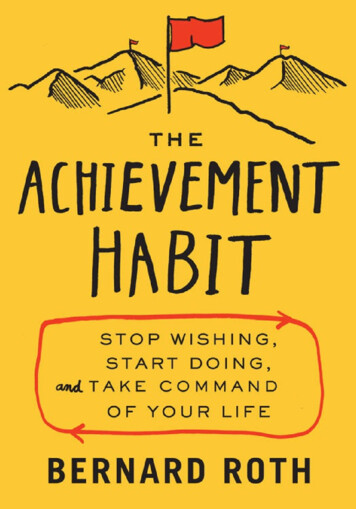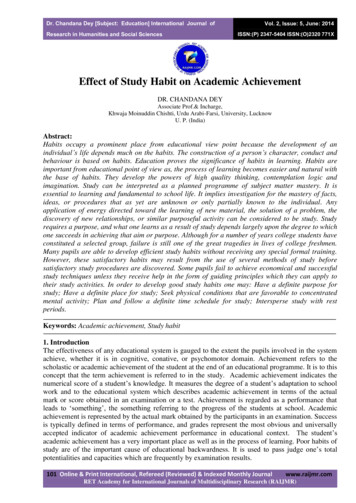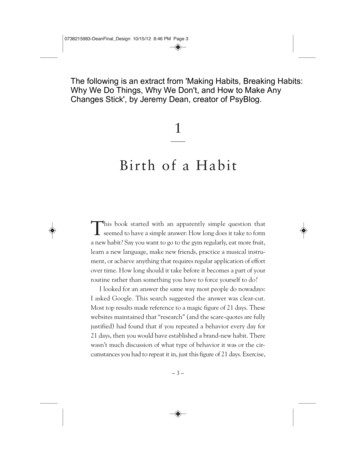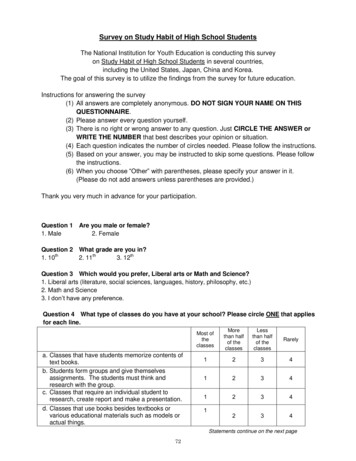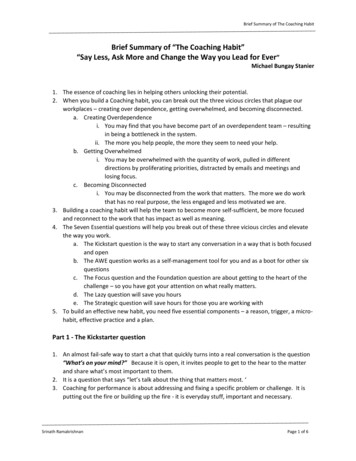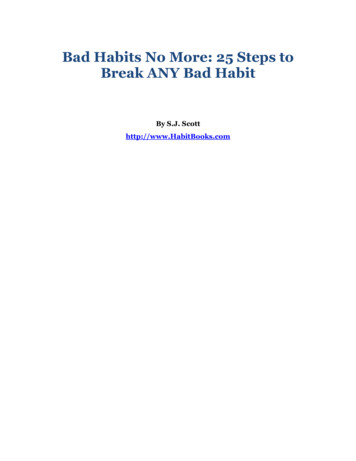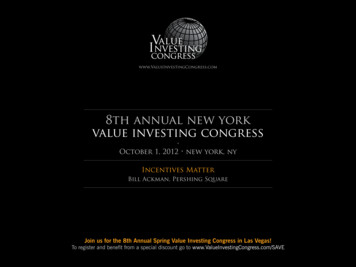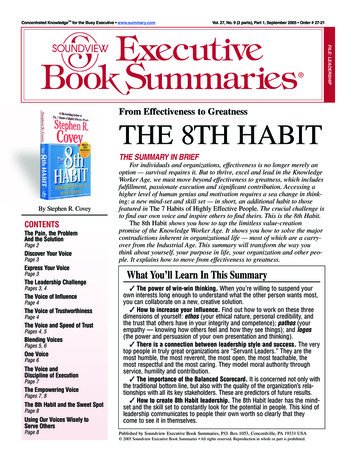
Transcription
Concentrated Knowledge for the Busy Executive www.summary.comVol. 27, No. 9 (3 parts), Part 1, September 2005 Order # 27-21From Effectiveness to GreatnessTHE 8TH HABITTHE SUMMARY IN BRIEFBy Stephen R. CoveyCONTENTSThe Pain, the ProblemAnd the SolutionPage 2Discover Your VoicePage 3Express Your VoicePage 3The Leadership ChallengePages 3, 4The Voice of InfluencePage 4The Voice of TrustworthinessPage 4The Voice and Speed of TrustPages 4, 5Blending VoicesPages 5, 6One VoicePage 6The Voice andDiscipline of ExecutionPage 7The Empowering VoicePages 7, 8The 8th Habit and the Sweet SpotPage 8Using Our Voices Wisely toServe OthersPage 8For individuals and organizations, effectiveness is no longer merely anoption — survival requires it. But to thrive, excel and lead in the KnowledgeWorker Age, we must move beyond effectiveness to greatness, which includesfulfillment, passionate execution and significant contribution. Accessing ahigher level of human genius and motivation requires a sea change in thinking: a new mind-set and skill set — in short, an additional habit to thosefeatured in The 7 Habits of Highly Effective People. The crucial challenge isto find our own voice and inspire others to find theirs. This is the 8th Habit.The 8th Habit shows you how to tap the limitless value-creationpromise of the Knowledge Worker Age. It shows you how to solve the majorcontradictions inherent in organizational life — most of which are a carryover from the Industrial Age. This summary will transform the way youthink about yourself, your purpose in life, your organization and other people. It explains how to move from effectiveness to greatness.What You’ll Learn In This Summary The power of win-win thinking. When you’re willing to suspend yourown interests long enough to understand what the other person wants most,you can collaborate on a new, creative solution. How to increase your influence. Find out how to work on these threedimensions of yourself: ethos (your ethical nature, personal credibility, andthe trust that others have in your integrity and competence); pathos (yourempathy — knowing how others feel and how they see things); and logos(the power and persuasion of your own presentation and thinking). There is a connection between leadership style and success. The verytop people in truly great organizations are “Servant Leaders.” They are themost humble, the most reverent, the most open, the most teachable, themost respectful and the most caring. They model moral authority throughservice, humility and contribution. The importance of the Balanced Scorecard. It is concerned not only withthe traditional bottom line, but also with the quality of the organization’s relationships with all its key stakeholders. These are predictors of future results. How to create 8th Habit leadership. The 8th Habit leader has the mindset and the skill set to constantly look for the potential in people. This kind ofleadership communicates to people their own worth so clearly that theycome to see it in themselves.Published by Soundview Executive Book Summaries, P.O. Box 1053, Concordville, PA 19331 USA 2005 Soundview Executive Book Summaries All rights reserved. Reproduction in whole or part is prohibited.FILE: LEADERSHIP
THE 8TH HABITby Stephen R. Covey— THE COMPLETE SUMMARYThe Pain, the ProblemAnd the SolutionMore than 25 years ago, Muhammad Yunus was teachingeconomics at a university in Bangladesh when he met awoman making bamboo stools for two U.S. pennies a day.She explained that because she didn’t have the money tobuy the bamboo to make the stools, she had to borrow froma trader who imposed the condition that she had to sell theproduct to him alone, at a price that he decided.Yunus made a list of 42 similar workers around the village who could use very small loans to improve theirlives. The total needed by all those people was 27. Afterloaning them the money, he was paid back every penny.Grameen BankAfter making many more loans and proving that poorpeople would pay back every cent, Yunus struggled unsuccessfully to find a local bank that would lend small amountsof money to the poor people in nearby villages. He thenspent two years setting up a formal, independent bank to dojust that. On Oct. 2, 1983, Grameen Bank was created.Grameen Bank now works in more than 46,000 villagesin Bangladesh, has 1,267 branches and more than 12,000staff members, and has lent more than 4.5 billion, in loansof 12 to 15. A housing loan is 300. At the heart of thisempowerment are individuals who chose to become selfreliant, independent entrepreneurs producing goods out oftheir own homes or neighborhoods to become economicallyviable and successful. They found their voices.The PainMost people in organizations today are neither fulfillednor excited. They’re frustrated and uninvolved in theirorganization’s goals. That’s why our high-pressure, 24/7era requires more than effectiveness (the “7 Habits”). Toachieve greatness, we need an “8th Habit”: Find yourvoice and inspire others to find theirs.The ProblemOur basic management practices come from theIndustrial Age. These include: The belief that you must control people; Our view of accounting (People are an expense;machines are assets.);The carrot-and-stick motivational philosophy; andCentralized budgeting, which creates hierarchies andbureaucracies to drive “getting the numbers” — a reactiveprocess that produces “kiss-up” cultures bent on “spending so we won’t lose it next year.”As people consent to be controlled like things, their passivity only fuels leaders’ urge to direct and manage.There’s a simple connection between the controlling,Industrial Age, “thing” paradigm that dominates today’sworkplace and the inability of managers and organizations toinspire people’s best contributions in the Knowledge WorkerAge: People choose how much of themselves to give to theirwork, depending on how they’re treated. Their choices mayrange from rebelling or quitting (if they’re treated as things),to creative excitement (if they’re treated as whole people). The SolutionMost great organizations start with one person who firstchanged him- or herself, then inspired others. Such peoplerealize that they can’t wait for their boss or organization tochange. They become an island of excellence in a sea ofmediocrity. They learn their true nature and gifts, then usethem to envision what they want to accomplish. They findand use their voice.Greatness involves transcending the negative cultural“software” of ego, scarcity, comparison and competitiveness, and choosing to become the creative force in your life.All of us can choose greatness — we can cultivate a magnificent spirit in facing a serious disease, make a differencein the life of a child, be a catalyst inside an organization, orinitiate or contribute to a cause. The author: Stephen R. Covey is a respected leadershipauthority, family expert, teacher, author, organizational consultant, and co-founder and vice chairman of FranklinCovey Co.From THE 8th HABIT by Stephen R. Covey. Copyright 2004 by FranklinCovey Co. Reprinted by permission ofFree Press, a Division of Simon & Schuster, Inc., 1230Avenue of the Americas, New York, NY 10020. 409 pages. 26.00. ISBN 0-684-84665-9.Summary Copyright 2005 by Soundview ExecutiveBook Summaries, www.summary.com, 1-800-SUMMARY,1-610-558-9495.For additional information on the author,go to: http://my.summary.comPublished by Soundview Executive Book Summaries (ISSN 0747-2196), P.O. Box 1053, Concordville, PA19331 USA, a division of Concentrated Knowledge Corp. Published monthly. Subscriptions: 195 per year in theUnited States, Canada and Mexico, and 275 to all other countries. Periodicals postage paid at Concordville, Pa.,and additional offices.Postmaster: Send address changes to Soundview, P.O. Box 1053, Concordville, PA 19331. Copyright 2005by Soundview Executive Book Summaries.Available formats: Summaries are available in print, audio and electronic formats. To subscribe, call us at1-800-SUMMARY (610-558-9495 outside the United States and Canada), or order on the Internet at www.summary.com.Multiple-subscription discounts and corporate site licenses are also available.2Soundview Executive Book Summaries SoundviewExecutive Book Summaries ALAN PERLMAN – Contributing EditorDEBRA A. DEPRINZIO – Senior Graphic DesignerCHRIS LAUER – Senior EditorCHRISTOPHER G. MURRAY – Editor in ChiefGEORGE Y. CLEMENT – Publisher
The 8th Habit — SUMMARYPART ONE: FIND YOUR VOICEDiscover Your VoiceExpress Your VoiceWe can discover our voice because of three giftswe’re born with. These gifts are:Gift #1: The Freedom to Choose. Our past, ourgenes, the way others have treated us — these influenceus but don’t determine us. Between stimulus andresponse there is a space where we choose our response.In our choices lie growth and our happiness.Gift #2: Natural Laws or Principles. To use wiselythat space between stimulus and response, we must liveby natural laws that dictate the consequences of behavior. Positive consequences come from fairness, kindness,respect, honesty, integrity, service and contribution.Gift #3: The Four Intelligences. These are: Mental Intelligence (IQ). IQ is our ability to analyze, reason, think abstractly and comprehend. Physical intelligence (PQ). PQ is what our bodydoes without conscious effort, coordinating 7 trillioncells with incredibly complex precision. Emotional Intelligence (EQ). EQ is one’s self-knowledge, self-awareness, social sensitivity, empathy and abilityto communicate successfully. It is a sense of timing andappropriateness, and having the courage to acknowledgeweaknesses and express and respect differences. Spiritual Intelligence (SQ). SQ is our drive for meaning and connection with the infinite. We use this to developour longing and capacity for meaning, vision and value. Itallows us to dream and to strive. It’s our conscience.SQ helped the late president of Egypt, Anwar Sadat(who, with former Israeli prime minister MenachemBegin, brought about the Camp David Peace Accordbetween Israel and Egypt) write these words while hewas a young man in solitary confinement in a Cairoprison, “He who cannot change the very fabric of histhought will never be able to change reality, and willnever, therefore, make any progress.” Great achievers develop their mental energy intovision. Vision is applied imagination. Everything is created first as a mental creation, then as a physical reality.Vision also means affirming others, believing in themand helping them realize their potential.Great achievers develop their physical energy into discipline. They don’t deny reality. They accept the sacrificeentailed in doing whatever it takes to realize their vision.Only the disciplined are truly free. Only a person whohas disciplined him- or herself for decades to play thepiano is free to create magnificent art.Great achievers develop their emotional energy intopassion — desire, conviction and drive. Passion appearsas optimism, excitement, emotional connection and determination, and is deeply rooted in the power of choice.Passionate people believe in creating their own future.Great achievers develop their spiritual energy into conscience — their inward moral sense of what’s right andwrong, and their drive toward meaning and contribution.Moral authority makes formal authority work toward positive ends. Hitler had vision, discipline and passion, but wasdriven by a mad ego. Lack of conscience was his downfall.Conscience — the small voice within us — is quiet andpeaceful. It deeply reveres people and sees their potentialfor self-control. It empowers, understands the value of allpeople, and affirms their power and freedom to choose. Itvalues feedback and tries to see the truth in it.But our ego is a tyrant. It micromanages, disempowersand excels in control. It is threatened by negative feedback.It punishes the messenger, interprets all data in terms ofself-preservation, censors information and denies reality.We must control our ego and let our conscience guideour moment-to-moment behavior. As we develop the fourintelligences — physical, mental, emotional and spiritual— in their highest manifestations, we find our voice. PART TWO: INSPIRE OTHERS TO FIND THEIR VOICEThe Leadership ChallengeThe leadership challenge is to enable people to sensetheir individual innate worth and potential for greatness,and contribute their talents and passion — their voice —to accomplish the organization’s highest priorities in aprincipled way. Leaders must model the four intelligences, so that the organization won’t neglect them.If an organization neglects its spirit and conscience,the result is low trust; backbiting; in-fighting; victimism; defensiveness; information hoarding; and defensive, protective communication.If it neglects its mind, it has no shared vision or common value system. If there’s an ambiguous, chaotic culture, people act with hidden agendas, play politicalgames and use different criteria in decision-making.When there’s widespread neglect of discipline, there’s noexecution or systemic support for the priorities of the organization. Processes, culture and rules replace human judgment. Bureaucracy, hierarchies and regulations replace trustand produce the codependent “wait until told” mentality.When the heart is neglected, there’s profound disempowerment. Thus, a great deal of moonlighting, day-Soundview Executive Book Summaries (continued on page 4)3
The 8th Habit — SUMMARYThe Leadership Challenge(continued from page 3)dreaming, boredom, escapism, anger, fear, apathy andmalicious obedience results.Where there’s no trust, “servant leaders” model trustworthiness. Where there’s no common vision or values,they try to create them. Where there’s misalignment, theyalign goals, structures, systems and processes. Wherethere’s disempowerment, they empower individuals andteams at the project or job level. This kind of leadershipaffirms people’s worth and unites them as a te
The 8th Habit leader has the mind-set and the skill set to constantly look for the potential in people. This kind of leadership communicates to people their own
